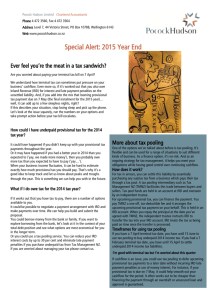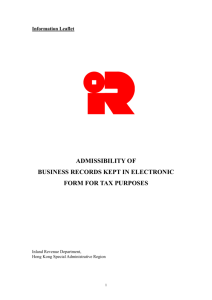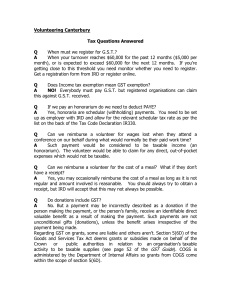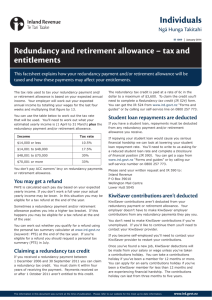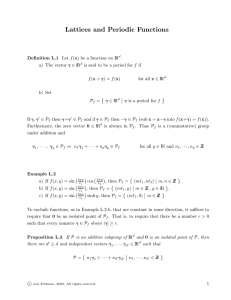Wilco Special Alert Year End 2015
advertisement
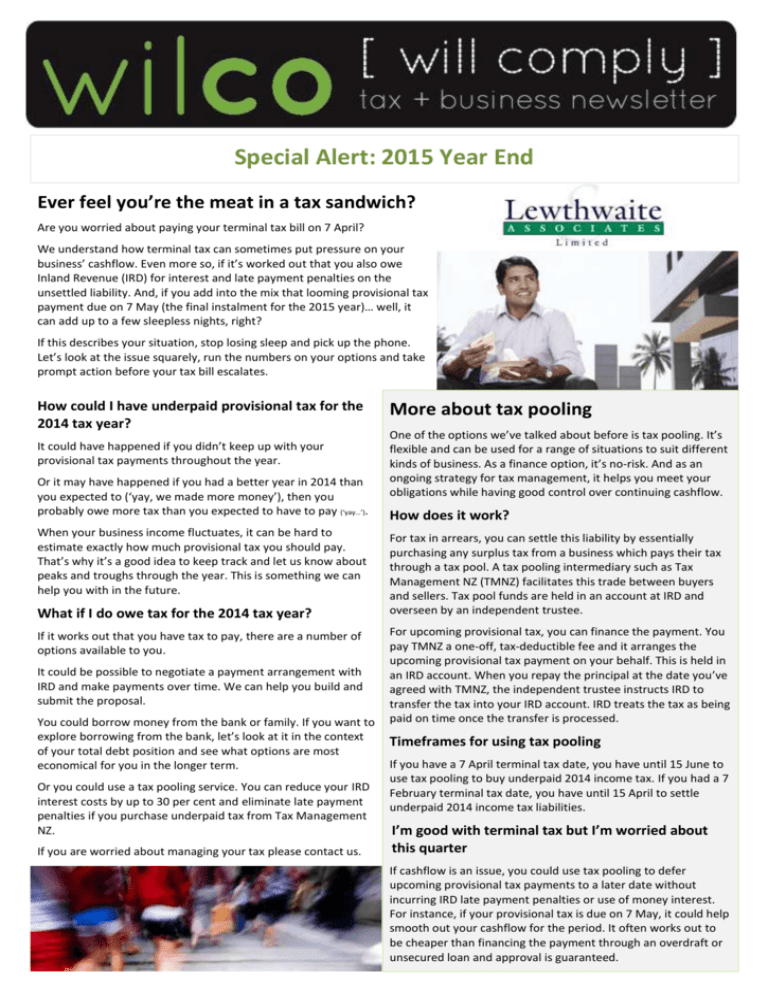
Special Alert: 2015 Year End Ever feel you’re the meat in a tax sandwich? Are you worried about paying your terminal tax bill on 7 April? We understand how terminal tax can sometimes put pressure on your business’ cashflow. Even more so, if it’s worked out that you also owe Inland Revenue (IRD) for interest and late payment penalties on the unsettled liability. And, if you add into the mix that looming provisional tax payment due on 7 May (the final instalment for the 2015 year)… well, it can add up to a few sleepless nights, right? If this describes your situation, stop losing sleep and pick up the phone. Let’s look at the issue squarely, run the numbers on your options and take prompt action before your tax bill escalates. How could I have underpaid provisional tax for the 2014 tax year? It could have happened if you didn’t keep up with your provisional tax payments throughout the year. Or it may have happened if you had a better year in 2014 than you expected to (‘yay, we made more money’), then you probably owe more tax than you expected to have to pay (‘yay…’). When your business income fluctuates, it can be hard to estimate exactly how much provisional tax you should pay. That’s why it’s a good idea to keep track and let us know about peaks and troughs through the year. This is something we can help you with in the future. What if I do owe tax for the 2014 tax year? If it works out that you have tax to pay, there are a number of options available to you. It could be possible to negotiate a payment arrangement with IRD and make payments over time. We can help you build and submit the proposal. You could borrow money from the bank or family. If you want to explore borrowing from the bank, let’s look at it in the context of your total debt position and see what options are most economical for you in the longer term. Or you could use a tax pooling service. You can reduce your IRD interest costs by up to 30 per cent and eliminate late payment penalties if you purchase underpaid tax from Tax Management NZ. If you are worried about managing your tax please contact us. More about tax pooling One of the options we’ve talked about before is tax pooling. It’s flexible and can be used for a range of situations to suit different kinds of business. As a finance option, it’s no-risk. And as an ongoing strategy for tax management, it helps you meet your obligations while having good control over continuing cashflow. How does it work? For tax in arrears, you can settle this liability by essentially purchasing any surplus tax from a business which pays their tax through a tax pool. A tax pooling intermediary such as Tax Management NZ (TMNZ) facilitates this trade between buyers and sellers. Tax pool funds are held in an account at IRD and overseen by an independent trustee. For upcoming provisional tax, you can finance the payment. You pay TMNZ a one-off, tax-deductible fee and it arranges the upcoming provisional tax payment on your behalf. This is held in an IRD account. When you repay the principal at the date you’ve agreed with TMNZ, the independent trustee instructs IRD to transfer the tax into your IRD account. IRD treats the tax as being paid on time once the transfer is processed. Timeframes for using tax pooling If you have a 7 April terminal tax date, you have until 15 June to use tax pooling to buy underpaid 2014 income tax. If you had a 7 February terminal tax date, you have until 15 April to settle underpaid 2014 income tax liabilities. I’m good with terminal tax but I’m worried about this quarter If cashflow is an issue, you could use tax pooling to defer upcoming provisional tax payments to a later date without incurring IRD late payment penalties or use of money interest. For instance, if your provisional tax is due on 7 May, it could help smooth out your cashflow for the period. It often works out to be cheaper than financing the payment through an overdraft or unsecured loan and approval is guaranteed. Essential housekeeping for end of year Contracts. Have you invoiced retentions that are not due and Employee expenses. Amounts owing for holiday pay, payable for another year? If they are payable in the current year they need to be declared as income but if not, the income will be deferred to a subsequent year. bonuses, redundancy payments, long service leave etc. can be claimed, if you have committed to them at year end and they’re paid within 63 days. Credit notes. Credit notes issued to customers after 31 Expenses. Can you pre-pay any expenses before 31 March may be applied to the previous year, potentially reducing the current year’s taxable income. March? You may be able to claim for them. Debtors. Have you taken reasonable steps to recover bad debts? If so, and you write them off before 31 March, you may be able to claim a deduction. Discounts for prompt payment. If you maintain a discount Fixed assets. Do you have any that you are no longer using or don’t intend to use in future? If so, the book value may be able to be written off. Loss offset elections and subvention payments. Talk to us if you think the company will make a loss. reserve, it is deductible. In the first year a deduction for the actual discount percentage is allowed. In subsequent years, the amount is calculated as a percentage. Different rules apply if credit extended to customers exceeds 93 days. Planned maintenance and repairs. If any significant Dividends and imputation credits. Consider reviewing Stock. Dispose of obsolete trading stock by 31 March or planned dividend payments. The imputation credit account must not have a debit balance at 31 March otherwise penalties may arise. write it down to net realisable value (lesser of cost or market value). If the stock is worth less than $10,000 and your turnover is less than $1.3m for the year, you won’t need to include your stock movement for tax purposes. maintenance or repairs are due, bring this forward to get an early tax deduction. What changes on 1 April 2015? Minimum wage Student Loan Living Cost The minimum wage will increase to $14.75 per hour. Training and starting-out minimum wages will increase to $11.80 per hour. The maximum weekly amount available will increase to $176.86 per week. Child support Student Allowances The amount of child support some parents pay or receive may change. Inland Revenue’s new formula for calculating child support now includes both parents' incomes and circumstances, and recognises a wider range of care. To obtain the maximum allowance you must not earn more than $211.96 a week before tax (and you must meet all the other eligibility criteria). KiwiSaver KiwiSaver HomeStart Grant replaces the KiwiSaver First Home Deposit Subsidy. Under the HomeStart Grant, member tax credits will now be able to withdrawn from KiwiSaver savings, which will now mean first home buyers are able to withdraw amounts from their KiwiSaver savings (except for the $1,000 kick-start). It should also be easier for more people to buy a newly built home as the grant for newly built homes has increased from the previous level of the First Home Deposit Subsidy. House price caps which determine the eligibility for HomeStart grants and Welcome Home loans have also increased. If you are aged 18-23 and have no children, the combined taxable income of both your parents in the last financial year must be under: $84,163.86 before tax (if you are living at home while studying) $91,448.30 before tax (if you are living away from home to study) If you have a partner and children, your own and your partner’s combined taxable income needs to be under $882.98 a week before tax. The allowance will reduce for every cent earned above this. Disclaimer This publication has been carefully prepared, but it has been written in general terms only. The publication should not be relied upon to provide specific information without also obtaining appropriate professional advice after detailed examination of your particular situation.
